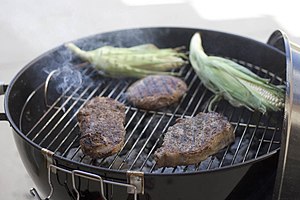| (Photo credit: Wikipedia) |
I love the story of in the book of Daniel of Hananiah, Mishael, and Azariah. But you might know it better as the story of Shadrach, Meshach, and Abednego, the names given to them by the prince of the eunuchs of Babylon.
Hananiah, Mishael, and Azariah would not bow down and worship the image set up by Nebuchadnezzar the king of Babylon, even though the penalty for not doing so was to be cast into a fiery furnace.
Their answer to Nebuchadnezzar was:
"If it be so, our God whom we serve is able to deliver us from the burning fiery furnace, and He will deliver us out of thine hand, O king. But if not, be it known unto thee, O king, that we will not serve thy gods, nor worship the golden image which thou hast set up," (Daniel 3:17,18)
In his fury, Nebuchadnezzar had the three men thrown into a fire so hot that it killed the guards who threw them in. Yet, Hananiah, Mishael, and Azariah not only lived, they walked in the fire, along with a fourth man who "is like the Son of God."
Hananiah, Mishael, and Azariah came out of the furnace alive, the fire having no power over their bodies, not a hair of their head singed, their clothes were not burned, "nor the smell of fire had passed on them."
When I think of Hananiah, Mishael, and Azariah coming out of that fire without the smell of smoke, I think of how many times in my own life I have passed through a fiery trial (though not literally, thank the Lord.) I have come out to give the Lord thanks in the midst of the trial, but yet I allowed the "smell of smoke" to linger on me. What I mean by that is, I didn't have as joyful an attitude as I should have had in and after the situation. I didn't seek to praise the Lord in the midst of the suffering as I should have. Maybe I complained about my situation too much. Maybe I tried to blame others for it instead of just praising the Lord and thanking Him. Maybe I concentrated more on the problem than on the Lord as the solution. Maybe I felt a needed to let everyone know I had a problem. The point is, I smelled too much like smoke. My clothes were scorched and my hair was singed.
Sometimes this is evident by the "but" in our sentences. "I'm trusting the Lord about this, but. . ." is usually an indication of the smell of smoke. We end the sentence, in fact we probably end the whole paragraph, with the problem instead of the Lord as the solution, instead of the affirmation of faith in the Lord. This is especially true since grammatically "but" usually implies a contrast or exception, but not always.
It is different if the sentence is like this: "I'm being thrown in the furnace, but the Lord is going to deliver me out of the hand of King Nebuchadnezzar. Even if He doesn't, I'm not going to bow down to the graven image. I'm going to have faith in my Lord." There's a big difference in where that "but" falls as to whether or not there is the smell of smoke in the sentence.
We know we should not be surprised that there are troubles out there coming our way. It is my hope that we will face them with the same firm faith and conviction as our brothers Hananiah, Mishael, and Azariah. May we walk out of our own "fiery furnances" knowing we have walked with that "Fourth Form" and knowing that others around us sense no "smell of the fire." May they only sense the sweet fragrance of the Rose of Sharon who resides in and through us.
"Beloved, think it not strange concerning the fiery trial which is to try you, as though some strange thing happened unto you: But rejoice, inasmuch as ye are partakers of Christ's sufferings; that, when His glory shall be revealed, ye may be glad also with exceeding joy."
1 Peter 4:12, 13



No comments:
Post a Comment